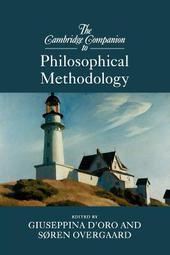
|
The Cambridge Companion to Philosophical Methodology
Paperback / softback
Main Details
Description
The Cambridge Companion to Philosophical Methodology offers clear and comprehensive coverage of the main methodological debates and approaches within philosophy. The chapters in this volume approach the question of how to do philosophy from a wide range of perspectives, including conceptual analysis, critical theory, deconstruction, experimental philosophy, hermeneutics, Kantianism, methodological naturalism, phenomenology, and pragmatism. They explore general conceptions of philosophy, centred on the question of what the point of philosophising might be; the method of conceptual analysis and its recent naturalistic critics and competitors; perspectives from continental philosophy; and also a variety of methodological views that belong neither to the mainstream of analytic philosophy, nor to continental philosophy as commonly conceived. Together they will enable readers to grasp an unusually wide range of approaches to methodological debates in philosophy.
Author Biography
Soren Overgaard is Associate Professor of Philosophy at the University of Copenhagen. His recent publications include Wittgenstein and Other Minds (2007) and An Introduction to Metaphilosophy (2013). Giuseppina D'Oro is Reader in Philosophy at Keele University. Her recent publications include Collingwood and the Metaphysics of Experience (2002), Collingwood's An Essay on Philosophical Method (2005) and Reasons and Causes: Causalism and Anti-Causalism in the Philosophy of Action (2013).
Reviews'What sets this Companion apart from other recent work on philosophical methodology is its perspective. The essays in this timely volume focus on three metaphilosophical domains - conceptual analysis in analytic philosophy, Continental methodologies, and methodologies lying at the analytic/Continental divide. ... This excellent resource will be valuable to those interested in either metaphilosophy overall or one particular methodology. ... Summing Up: Highly recommended. Lower-division undergraduates through faculty.' J. McBain, CHOICE
|